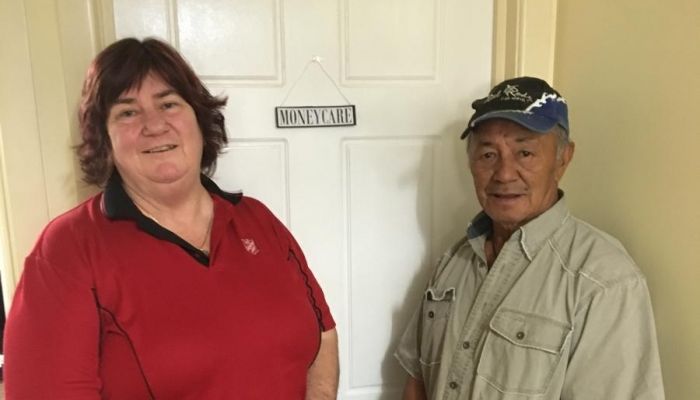A bit of a lifesaver
10 October 2021

Joseph with his first financial counsellor, Jenny, who helped Joseph organise his budget.
Removing stigma and shame from financial struggle
In Australia, over three million people are living below the poverty line. That’s one in eight people. As we approach Anti-Poverty Week – 17-23 October – the Salvos are encouraging those doing it tough to reach out for help. Financial hardship can happen to anyone at any time, and accessing support early is important for a positive outcome.
Words Naomi Singlehurst
A single father of four, Joseph was proud that he had worked his whole life to support his family. He had driven taxis for many years in Brisbane and often worked a second job. His children were now young adults working hard to buy their own homes.
At home one day, Joseph heard gunfire from a nearby house and, worried about local kids, went to investigate. The 61-year-old was shot twice. A long hospitalisation followed, and before long, Joseph had developed symptoms of post-traumatic stress disorder (PTSD).
Joseph’s life changed abruptly. He had to stop work, juggle his physical and emotional health issues, and pay his living expenses on a vastly reduced income.
According to Tony Devlin, who leads The Salvation Army Moneycare free financial counselling service, an unexpected event can financially and emotionally “turn a person’s world around very quickly”.
“It could be an employment issue, a health issue, deaths in the family, relationship breakdown, family and domestic violence,” he says. “Around 90 per cent of community members who contact Moneycare have experienced the type of unexpected life event that could happen to anyone, at any time.”
Debt and anxiety
For Joseph, it wasn’t long before bills started to pile up and the mailbox filled with letters from creditors. As the pressure increased, Joseph says his anger and anxiety grew.
His daughter eventually made him an appointment to see a Salvation Army Moneycare free financial counsellor, who immediately began working to ease Joseph’s financial burden. This included ‘hardship provision’ for his loan and working on payment plans for his expenses.
For the past nine years, Joseph has continued to make regular Moneycare appointments to help him stay on track with his budgeting. He says just the knowledge that someone is “in his corner” means a great deal.
“Jenny [Joseph’s first financial counsellor] really helped me budget,” he explains. “She showed me how to push money into certain places and organise payments directly from my pension. When Jenny moved out of the role, Sue came along and she has also helped me out a [great deal] since.
“Without the help to budget … I might have lost my house. Also, if the bills build up, I start getting PTSD issues again. So … I think it has been a bit of a lifesaver.”
Over the past few years, Joseph has become a regular face at his local Salvos, attending a men’s group as well as his Moneycare appointments. He is much happier and says even his children have noticed the change in him.
Not alone
Poverty and hardship can affect anyone. Research shows that nearly eight in 10 of those seeking assistance from Moneycare did not experience difficulties with financial literacy. Yet, these individuals faced financial problems that were often unexpected or beyond their control.
“Financial hardship and poverty are not things that people easily talk about,” says Tony. “They are often hidden. For example, people will quite often talk about relationships and other things but won’t say, ‘I don’t have enough money to do the grocery shopping today’, or ‘I don’t have enough money to pay the rent’. It is often the last thing that people reach out to others about.”
Tony says that normalising such conversations may encourage community members to seek help earlier from family, friends and services such as Moneycare.
“We know that people come to Moneycare in particular, often when it has developed into a real crisis. Then there are often less options to deal with the issues. If people had come and seen us earlier, it would be a whole lot easier for everyone. That is why it is important to demystify financial issues.”
For more information, go to salvationarmy.org.au/get-involved/anti-poverty-week/

Comments
No comments yet - be the first.